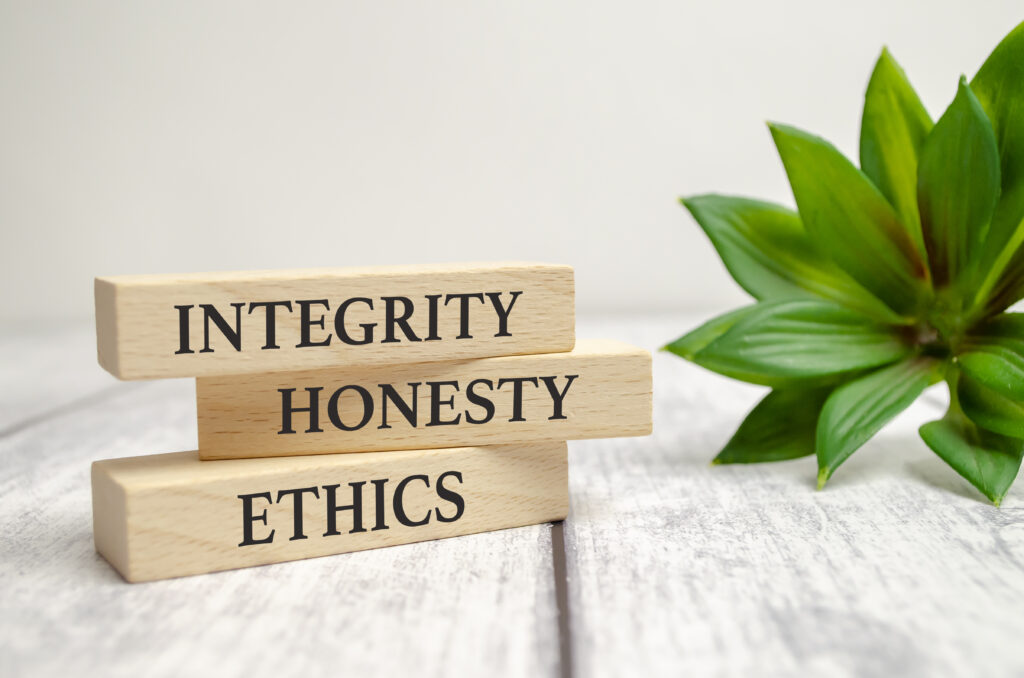Introduction
In today’s rapidly evolving business landscape, the pursuit of profit often takes center stage. However, the importance of business ethics and integrity cannot be overlooked. In fact, these principles are the bedrock for sustainable and successful enterprises. Business ethics and integrity encompass a range of values, practices, and behaviors that guide a company’s interactions with its stakeholders, shaping its reputation and long-term viability.
The Essence of Business Ethics

Business ethics are a set of moral principles and values that guide decision-making and conduct within an organization. It involves making choices that are not only legally sound but also morally defensible. Business ethics extend beyond mere compliance with laws and regulations; they encompass the broader impact a company has on society, the environment, and its employees.
Importance of Integrity
Integrity is the cornerstone of ethical behavior in business. It involves consistently adhering to high moral and ethical standards, even when no one is watching. A business that operates with integrity is transparent, honest, and accountable for its actions. This not only fosters trust among stakeholders but also sets the foundation for long-term success.
Benefits of Embracing Ethics and Integrity

- Enhanced Reputation: Companies known for their ethical practices and integrity are more likely to earn the respect and trust of customers, employees, investors, and partners. A positive reputation can lead to increased loyalty, repeat business, and referrals.
- Employee Engagement: Ethical business practices create a positive work environment where employees feel valued and respected. Thus, this leads to higher job satisfaction, increased morale, and improved productivity.
- Risk Mitigation: Operating with integrity helps a company avoid legal and regulatory violations, as well as potential reputational damage. By adhering to ethical standards, businesses can minimize legal disputes and financial risks.
- Longevity: Sustainable success is built on a foundation of trust and credibility. So, Businesses that prioritize ethics and integrity are more likely to weather economic fluctuations and maintain their relevance over the long term.
- Innovation and Creativity: Ethical organizations tend to foster an atmosphere of openness and collaboration. So, the Employees are more likely to share ideas and take risks when they trust that their contributions will be valued and respected.
- Attracting Investment: Ethical and transparent businesses are often more attractive to socially responsible investors. So, these investors seek out companies that align with their values and are committed to responsible practices.
Challenges in Upholding Business Ethics

Upholding business ethics and integrity isn’t without its challenges. Moreover, the pressure to achieve short-term financial goals, competition, and the temptation to cut corners can sometimes lead to ethical lapses. However, we can mitigate these challenges through strong leadership, a robust code of ethics, regular training, and a commitment to creating a culture of ethics and compliance.
Conclusion
In the ever-evolving world of business, ethics and integrity must remain constant guiding lights. However, Companies that prioritize these principles cultivate an environment of trust, transparency, and accountability. By doing so, they not only create a positive impact on their immediate stakeholders but also contribute to a more ethical and sustainable business ecosystem on a global scale. As business leaders, embracing and championing business ethics and integrity is not just a choice – it’s a responsibility that paves the way for enduring success.
Disclaimer: The information provided in this blog is for educational purposes only and not a financial advice. Every individual’s financial situation is unique; consider consulting with a professional for personalized advice.
To read more, click here
Thank You For Reading, feel free to ask any questions in the comment section below.
Follow us on Social Media Platforms,
Click Here: Instagram, Facebook, YouTube, and Twitter
Stay Informed, Stay Responsible with My Finance World!










